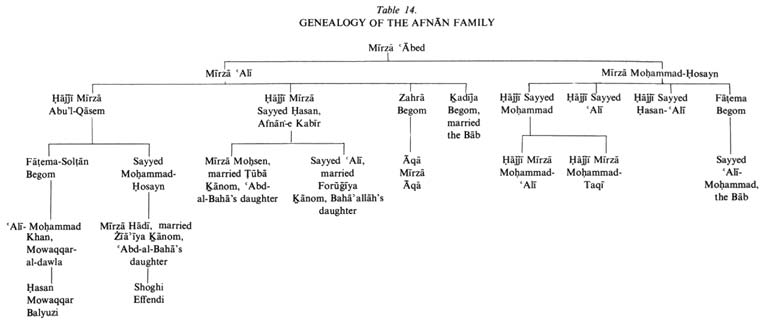
|
|
Abstract: Very brief article, short enough to qualify as "fair use." Notes: |
Afnán:
Genealogy of the Afnān Family
by Moojan Momen
published in Encyclopaedia Iranica, Volume 1New York: Columbia University, 1985
AFNĀN (“twigs” or “branches”), term used in the Bahaʾi faith (initially by Bahāʾallāh) to designate certain lines of descent in the maternal family of the Bāb. The Bāb married Ḵadīǰa Begom, his mother’s paternal cousin, and the Afnān are the siblings of his mother and his wife, together with all their descendants. The family members have no administrative functions or privileges and their designation is purely honorary. The following are brief notes on some of the most important of them:
Table: Genealogy of the Afnān Family

click for larger image
- Ḵadīǰa Begom (1226-99/1811-82), wife of the Bāb and the first of the Afnān to become a believer in him. For many years she was isolated in her belief and under much pressure.
- Ḥāǰǰī Sayyed ʿAlī, Ḵāl-e Aʿẓam (1212-66/1797-1850). He was responsible for the upbringing of the Bāb, whose father died early. He and Ḵadīǰa Begom were the only two members of the Afnān to believe in the Bāb during his lifetime. He died as one of the “seven martyrs” of Tehran.
- Āqā Mīrzā Āqā, Nūr-al-dīn (1258-1321/1842-1903), related to both the Bāb’s maternal and paternal family. He was the next Afnān to become a believer in the Bāb (through Ḵadīǰa Begom). In 1296/1879, he moved to Port Said, where he set up a trading house. ʿAbd-al-Bahāʾ made him responsible for the restoration of the house of the Bāb in Shiraz, and its custodianship was made hereditary in his family.
- Ḥāǰǰī Sayyed Moḥammad, Ḵāl-e Akbar (1210-93/1795-1876). He was persuaded by Āqā Mīrzā Āqā to go to Baghdad in 1278/1861 and meet Bahāʾallāh, who wrote the Ketāb-e īqān in answer to his questions. After this he became a believer in the Bāb and Bahāʾallāh.
- Ḥāǰǰī Mīrzā Moḥammad ʿAlī (1240-1313/1824-96), a successful and wealthy merchant, whose trading activities took him as far as Bombay and Shanghai. In ʿEšqābād (Ashkhabad) he purchased lands and endowments for the Mašreq al-Aḏkār there.
- Ḥāǰǰī Mīrzā Moḥammad Taqī, Wakīl-al-dawla, Wakīl-al-Ḥaqq (1246-1330/1830-1912), a successful merchant in Yazd for many years. He then moved to ʿEšqābād where he devoted is wealth and energies to the building of the Mašreq al-Aḏkār there. He died in Haifa.
- ʿAlī-Moḥammad Khan Mowaqqar-al-dawla (1282-1339/1865-1921), consul-general, Bombay, 1898; Foreign Ministry agent in Fārs, 1900; governor of Būšehr, 1911-1915; minister of public works, trade and agriculture, 1921.
- Hasan Mowaqqar Balyuzi (1908-1980), chairman of the British National Spiritual Assembly (Maḥfel-e Rawḥānī-e Mellī), 1937-1960; appointed Hand of the Cause (Ayādī-ye Amr Allāh) by Shoghi Effendi, 1957; important Bahaʾi historian and author of several works, including translations of English literature into Persian.
Both the maternal and paternal families of the Bāb were Ḥosaynī Sayyeds of Shiraz. The paternal family (who are not regarded as Afnān) included the preeminent moǰtahed and marǰaʿ al-taqlīd Mīrzā Ḥasan Šīrāzī (Mīrzā-ye Šīrāzī), whose father was a paternal cousin of the Bāb’s father. In Bahaʾi terminology, the use of the term Afnān is paralleled by the use of the term Aḡṣān to designate the descendents of Bahāʾallāh.
Bibliography : Moḥammad-ʿAlī Fayżī, Ḵānadān-e Afnān, Tehran, 127 badīʿ /1970. Abu’l Qāsem Afnān’s book on the family of the Bāb (in preparation).

click for larger image
|
|